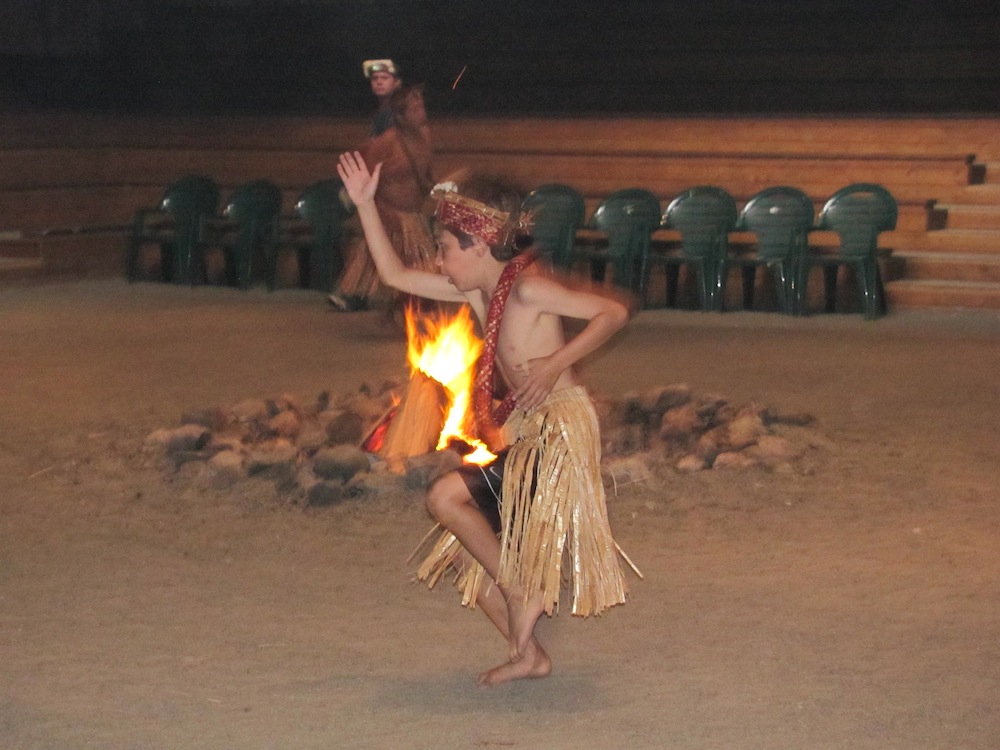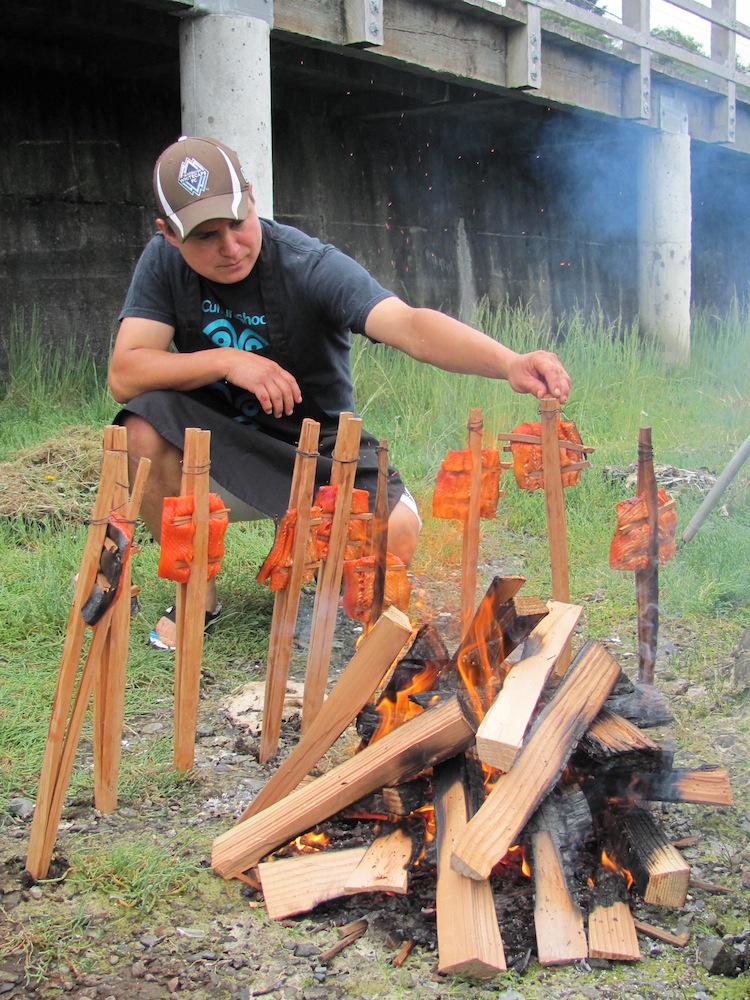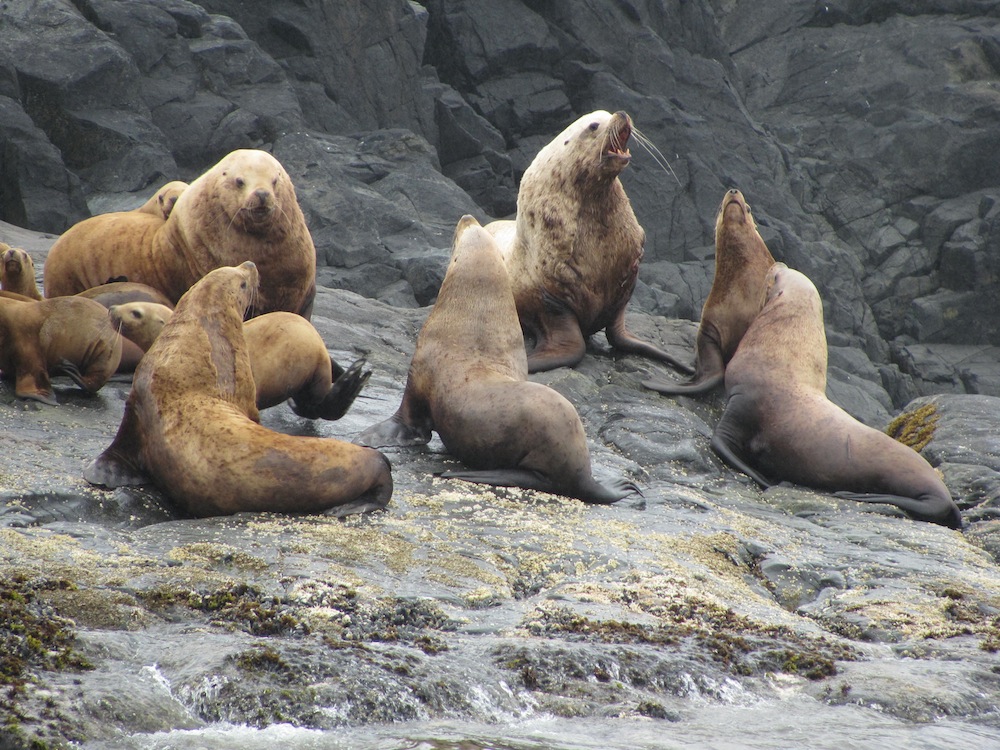This story is brought to you by the Aboriginal Tourism Association of BC. Click the logo above to stay connected to the Aboriginal community.

Young dancers with the T’sasala Cultural Group perform ancient ceremonial dances.
Photo by Tarina White
Rich heritage set amid pristine wilderness on North Vancouver Island
TARINA WHITE
ALERT BAY, B.C. - The pounding of the cedar log drum sets the rhythmic beat for the young dancers as they circle around an open fire. They’re sharing legends about their First Nations culture through traditional native dance.
The earthy smell of cedar wood smoke wafts through the Alert Bay Big House where the T’sasala Cultural Group performs ceremonial dances handed down through the generations.
The young dancers represent the resurgence of an ancient art form that was nearly lost when the Canadian government banned First Nations people from performing potlatch ceremonies and traditional dance between 1885 and 1951, says ‘Namgis elder Vera Newman, who hosts the one-hour performance.
Newman’s generation grew up with no understanding or pride in their culture because they were afraid to share their dances and stories. They were also banned from speaking their native tongue.
“Everything was almost lost. My age group didn’t know our culture,” she tells the audience between dances.
Newman is proud her culture has rebounded and now serves as a focal point of Alert Bay’s tourism industry. Once a thriving fishing community, Alert Bay on Cormorant Island off the northeast coast of Vancouver Island, has evolved into a powerhouse of native heritage.
I get a first-hand glimpse of the richness of heritage and what the area has to offer with my cultural guide, First Nations tour operator Mike Willie. He’s the owner of Sea Wolf Adventures, which takes visitors on a 20-minute boat ride from Telegraph Cove to Alert Bay for a three-hour tour of the community’s rich native history.
We begin at the ’Namgis Burial Grounds along the foreshore, which is one of the few places in coastal British Columbia where memorial totem poles remain in their original location. Willie explains why the graveyard is closed and must be viewed from the road.
“We are taught never to disturb the dead because we believe they could come and take you,” he says.
Willie then takes me to the internationally renowned U’mista Cultural Centre for a performance by the T’sasala Cultural Group at the Big House.
At U’mista, Willie explains the centre was named in honour of the historically significant collection of elaborately carved cedar masks and other regalia, which was seized by police in a 1921 potlatch raid at nearby Village Island.
“The word U’mista means when something special comes back,” he says.
Most of the regalia has been returned to the Kwakwaka'wakw People of North Vancouver Island from private collections and museums around the world, while the rest continues to be sought. Potlatch ceremonies continue to be held today to mark important events, Willie says, including marriage, the naming of children, transferring rights and mourning the dead. The word potlatch means “to give” and invited guests are given gifts for bearing witness to the event.
Among the unique experiences at U’mista Cultural Centre, which includes a museum, an art gallery and gift shop, is the opportunity to participate in an intimate group talk with an elder or native artist. With coffee cups in hand, we gather in a small circle and listen to today’s featured native elder, Newman, who shares her sometimes painful stories about her history.
“When the government came here they didn’t respect our value system,” she says, wiping away the tears that stream down her face. “It was really difficult growing up in that time.”
But times have changed for her people. That’s exemplified in a short walk from U’mista, the Aboriginal-owned Culture Shock Interactive Gallery where visitors get the chance to join First Nations People in traditional activities, including a salmon barbecue, cedar bark weavings, story telling at the Big House and canoe rides.

Alert Bay cultural guide K'odi Nelson shows how to cook a traditional salmon barbeque.
Photo by Tarina White
Sitting on the waterfront outside Culture Shock, we’re taught the First Nations secrets to cooking salmon on large cedar wood “pegs” over an open flame. Culture Shock also includes a waterfront coffee shop and a boutique that sells native artwork, jewelry, woven cedar articles and clothing.
Visitors to North Vancouver Island can also tour the Traditional Territories of the region’s First Nations People, which are scattered throughout the Mainland inlets across the Queen Charlotte Strait.
Nakwakto Rapids Tours, based out of Port Hardy, guides tourists on a four-hour return boat ride to the world’s fastest navigable tidal currents in the Traditional Territories. The tour is hosted by a cultural guide from the Gwa’sala-’Nakwaxda’xw Nations.
Our guide, Elisha Taylor-Child, points to a red ochre pictograph of a small child on a rock wall near the rapids, which can churn up to 16 knots and turn the inlet into whirlpools of white water. She explains her ancestors took the clothing of infants to the rock wall for an ancient ceremony.
“The water flows so rapidly through the area it’s like wiping the slate clean and ensuring the child has a long and prosperous life,” Taylor-Child says.

Steller sea lions lazing on the rocks.
Photo by Tarina White
The region is home to some of the West Coast’s most spectacular wildlife and we spot humpback whales blowing “sea smoke” into the air, dozens of Steller sea lions lazing on the rocks, sea otters floating on their backs in the water, playful porpoises and cormorants.
If you happen to be near Alert Bay on Friday and Saturday (July 26-27), when the community hosts the 31st annual Seafest in celebration of the community’s fishing heritage. The two-day event includes a fishing derby, live music, a seafood chowder cook-off, a fitness challenge, games for kids, a spaghetti eating competition, and much more.
Story links:
Go to our festival overview page to find details on the Alert Bay Seafest and MusicFest
Culture Shock Interactive Gallery, Alert Bay. Cultural experiences range from $60-$80 for adults and are half-price for kids.
Sea Wolf Adventures, Telegraph Cove. Tours $125 for adults and $60 for kids.
Nakwakto Rapids Tours, Port Hardy. $100 per person.
Where to stay:
Black Bear Resort Hotel, Port McNeill
Oceanview Cabins, Alert Bay
In Kamloops, one of the largest pow wows in western Canada will take place, August 2 to 4. Read more about it here.











